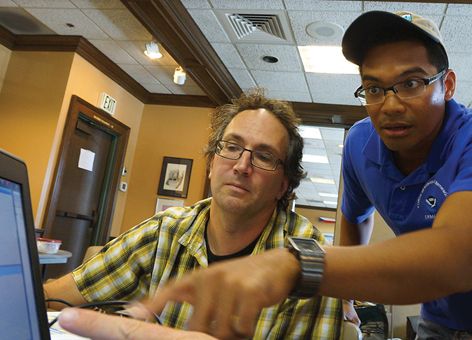NOAA Scientists Offer In-depth Workshops at 2014 International Oil Spill Conference
APRIL 14, 2014 -- Every three years, experts representing organizations ranging from government and industry to academic research and spill response gather at the International Oil Spill Conference.
This event serves as a forum for sharing knowledge and addressing challenges in planning for and responding to oil spills. NOAA plays a key role in planning and participating in this conference and is one of the seven permanent sponsors of the event.
This year is no different. In addition to presenting on topics such as subsea applications of dispersants and long-term ecological evaluations, Office of Response and Restoration staff are teaching several half-day workshops giving deeper perspectives, offering practical applications, and even providing hands-on experience.
If you'll be heading to the conference in Savannah, Ga., from May 5–8, 2014, take advantage of the following short courses to pick our brains and expand yours. Or, if you can't make it, consider applying for our next Science of Oil Spills training this August in Seattle, Wash.
Environmental Trade-offs Focusing on Protected Species
When: Monday, May 5, 2014, 8:00 a.m. to 12:00 p.m. Eastern
Who: Ed Levine (Scientific Support Coordinator), Jim Jeansonne (Scientific Support Coordinator), Gary Shigenaka (Marine Biologist), Paige Doelling (Scientific Support Coordinator)
Level: Introductory
What: Learn the basics about a variety of marine protected species, including whales, dolphins, sea turtles, birds, fish, corals, invertebrates, and plants. This course will cover where they are found, the laws that protect them, and other information necessary to understand how they may be affected by an oil spill. The course will discuss the impacts of specific response operations on marine protected species, and the decision making process for cleaning up the oil while also working in the best interest of the protected species. We will also discuss knowledge gaps and research needs and considerations when information is not available.
Advanced Oil Spill Modeling and Data Sources
When: Monday, May 5, 2014, 1:00 p.m. to 5:00 p.m. Eastern
Who: Glen Watabayashi (Oceanographer), Amy MacFadyen (Oceanographer), Chris Barker (Oceanographer)
Level: Intermediate
What: This is a rare opportunity to get hands-on experience with NOAA’s oil spill modeling tools for use in response planning and trajectory forecasting. We will lead participants as they use our General NOAA Operational Modeling Environment (GNOME) model for predicting oil trajectories and the Automated Data Inquiry for Oil Spills (ADIOS) model for predicting oil weathering.
Arctic Drilling Environmental Considerations
When: Monday, May 5, 2014, 1:00 p.m. to 5:00 p.m. Eastern
Who: Kate Clark (Acting Chief of Staff), Mary Campbell Baker (Northwest/Great Lakes Damage Assessment Supervisor)
Level: Introductory
What: How are Arctic development decisions being made given environmental, political, and societal uncertainty? How should they be made? Examine how a changing Arctic is intersecting with increased shipping and oil development to alter the profile of human and environmental risks.
Worldwide Practice Approaches to Environmental Liability Assessment
When: Monday, May 5, 2014, 1:00 p.m. to 5:00 p.m. Eastern
Who: Ian Zelo (Oil Spill Coordinator) and Jessica White (Deputy Director, NOAA's Disaster Response Center)
Level: Intermediate
What: In the United States, Natural Resource Damage Assessment (NRDA) regulations promulgated pursuant to the Oil Pollution Act of 1990 institutionalized the concept of NRDA and the cooperative NRDA. Learn some of the key principles related the NRDA and restoration process in the context of oil spills, as well as suggested best practices and how they may be implemented at various sites in the U.S. and worldwide.
 An official website of the United States government.
An official website of the United States government. 

